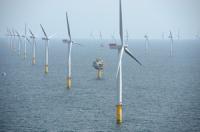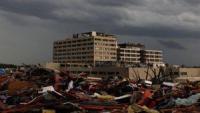-
A billion more people will be exposed to diseases as world temperatures rise
As many as a billion people could be newly exposed to disease-carrying mosquitoes by the end of the century because of global warming, says a new study that examines temperature changes on a monthly basis across the world.
-
-
Few pathways to an acceptable climate future without immediate action: Study
A new comprehensive study of climate change has painted over 5 million pictures of humanity’s potential future, and few foretell an Earth that has not severely warmed. But with immediate action and some luck, there are pathways to a tolerable climate future, scientists say.
-
-
Historic, widespread flooding to continue through May
Nearly two-thirds of the Lower 48 states face an elevated risk for flooding through May, with the potential for major or moderate flooding in 25 states, according to NOAA’s U.S. Spring Outlook issued today. The majority of the country is favored to experience above-average precipitation this spring, increasing the flood risk.
-
-
Rapidly melting tall ice-cliffs may trigger faster sea-level rise
Glaciers that drain ice sheets such as Antarctica or Greenland often flow into the ocean, ending in near-vertical cliffs. As the glacier flows into the sea, chunks of the ice break off in calving events. Although much calving occurs when the ocean melts the front of the ice, and ice cliff above falls down, a new study presents another method of calving: slumping. And this process could break off much larger chunks of ice at a quicker rate.
-
-
Offshore wind energy potential not exploited by U.S. energy companies

When it comes to wind energy, the United States is sitting on a gold mine, so to speak. It’s a moment of untapped potential that, if harnessed properly, could transform the way the U.S. uses energy, one expert says.
-
-
Mitigating impact of rising seas, storms along California’s coast
New coastal modeling research presents state, federal, and commercial entities with varying storm and sea level-rise scenarios to assist with planning for future infrastructure and mitigation needs along the California coast.
-
-
Droughts caused permanent loss to major California groundwater source
California’s Central Valley aquifer, the major source of groundwater in the region, suffered permanent loss of capacity during the drought experienced in the area from 2012 to 2015.
-
-
February 2019 ranked fifth hottest month on record for the globe
We recently concluded the second full month of 2019, and already the year to date has turned out on the warm side. Steady warmth around the globe made February the fifth hottest on record. Seasonally, the period from December 2018 through February 2019 ranked fourth hottest on record.
-
-
Potential impacts of future heat waves on humans and wildlife
Climate change is often talked about in terms of averages — like the goal set by the Paris Agreement to limit the Earth’s temperature increase to 2 degrees Celsius. What such numbers fail to convey is that climate change will not only increase the world’s average temperature, it will also intensify extreme heat waves that even now are harming people and wildlife.
-
-
Feeling the heat: Recognizing the risks of extreme weather
Heat waves are more dangerous than tornadoes, statistically. They kill more people than sharks, and put more human lives at risk than blizzards, floods or lightning storms. But they lack a certain dramatic flair, making it surprisingly difficult for many people to grasp and evaluate the real danger lurking behind their devastating effects. Recognizing those risks could be a matter of life or death – especially as a changing climate is making dangerous extreme heat events more and more likely every year in the United States.
-
-
Dealing with disaster

It took less than 90 minutes before students in Miaki Ishii’s first-year seminar started to talk openly about revolt. The unrest, however, wasn’t due to any political issue currently making headlines, but to a small room in Harvard’s Geological Museum and a handful of their classmates. The students took part in a role-playing game that saw them acting as citizens of the island of Montserrat, the tiny country’s government, and a group of scientists monitoring the island’s volcano. Why revolt? Because the students soon grew skeptical of the government’s ability to quickly and effectively respond to pressing environmental concerns.
-
-
Climate tool points to end of winter by 2050
Researchers have designed a tool which takes existing data and communicates the impacts of climate change in a way that people can engage with and better understand. The resulting new climate tool visualizes data which shows by 2050, Australians will no longer enjoy winter as they know it today and will experience a new season the designers are calling “New Summer.”
-
-
Forecasters use Iron Dome science to handle disasters

Typhoons, floods, droughts, earthquakes, hurricanes, wildfires — the frequency and intensity of natural disasters across the globe are worsening, and these deadly events could continue plaguing the planet as a result of climate change. Iron Dome tech firm uses rocket science to enable utilities to plan for and manage effects of wildfires, storms, hurricanes and earthquakes.
-
-
Wildfire risk in California no longer linked to winter precipitation
From 1600 to 1903, the position of the North Pacific jet stream over California was linked to the amount of winter precipitation and the severity of the subsequent wildfire season, the team found. Wet winters brought by the jet stream were followed by low wildfire activity, and dry winters were generally followed by higher wildfire activity. Wet winters no longer predict possible relief from severe wildfires for California, according to a new study.
-
-
Emission regulatory rollback: 200M metric tons of additional green house gasses annually
Following the release of the Fourth National Climate Assessment, the Trump administration is proposing to give four top climate-polluting industries a pass. A new report says that six specific regulatory rollbacks will cause an annual increase of more than 200 million metric tons of carbon dioxide equivalent, resulting in the loss of hundreds of billions of dollars in forgone benefits, and lead to tens of thousands of premature deaths.
-
- All
- Regional
- Water
- Biometrics
- Borders/Immig
- Business
- Cybersecurity
- Detection
- Disasters
- Government
- Infrastructure
- International
- Public health
- Public Safety
- Communication interoperabillity
- Emergency services
- Emergency medical services
- Fire
- First response
- IEDs
- Law Enforcement
- Law Enforcement Technology
- Military technology
- Nonlethal weapons
- Nuclear weapons
- Personal protection equipment
- Police
- Notification /alert systems
- Situational awareness
- Weapons systems
- Sci-Tech
- Sector Reports
- Surveillance
- Transportation
Advertising & Marketing: advertise@newswirepubs.com
Editorial: editor@newswirepubs.com
General: info@newswirepubs.com
2010-2011 © News Wire Publications, LLC News Wire Publications, LLC
220 Old Country Road | Suite 200 | Mineola | New York | 11501
Permissions and Policies
Editorial: editor@newswirepubs.com
General: info@newswirepubs.com
2010-2011 © News Wire Publications, LLC News Wire Publications, LLC
220 Old Country Road | Suite 200 | Mineola | New York | 11501
Permissions and Policies
